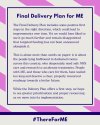In the Delivery Plan under the header 'Stimulating further research into ME/CFS'
Do we know anything about when this is happening & who's involved?
Later in 2025, DHSC, jointly with the NIHR and MRC, will be hosting a research showcase event for post-acute infection conditions research, including ME/CFS and long COVID. This event will:
- discuss recent evidence in the field, particularly new findings from the DecodeME study, and from long COVID studies which may open new avenues for investigation
- recognise the importance of research into ME/CFS and long COVID
- highlight important outstanding research questions
- spotlight the bespoke support available from NIHR and MRC for researchers in preparing applications
We hope the event will encourage researchers to join the ME/CFS and long COVID field and enable new collaborations across specialties and disciplines to stimulate further vital research.
Do we know anything about when this is happening & who's involved?

